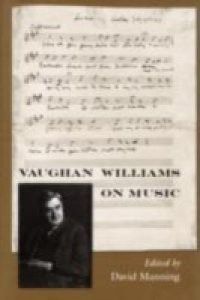Concert audiences have an enduring affection for the music of Ralph Vaughan Williams; a composer of dance, symphony, opera, song, hymnody, and film music, serious scholarship on his music is currently enjoying a revival. 2008 marks the 50th anniversary of Vaughan Williams passing. This collection brings together a host of lively writings, some for the first time, and many for the first time since their initial publication by one of the most articulate, beloved and engaging English composers. Making available essays, articles, broadcasts, and speech transcripts from 1901-1958, Vaughan Williams on Music exemplifies the multi-faceted nature of his contributions: active supporter of amateur music and English music, a leader in the folksong revival, educator, performer, and polemicist. Vaughan Williams was one of the cultural giants of his day, a figure of iconic stature whose influence stretched far beyond musical circles; his friendships with Bertrand Russell and G. M. Trevelyan, and his tireless work on behalf of a variety of organizations and causes, from Jewish refugees to the Third Programme, gave him a unique place in British national life. He also had a powerful influence in the United States, at a time when the international relationship was approaching its zenith. Through all these perspectives, the words are unmistakably those of a practicing composer; a young composer at the turn of the last century, trying to find his own musical voice amid widely diverse stylistic influences of the dominant and successful figures of Brahms, Strauss, and Tchaikovsky, and a mature composer in the mid-century, having found that glorious voice which continues to resound across the globe. The volume will be an important contribution to the literature not only on British music, but also on nineteenth- and twentieth-century British cultural and intellectual life as a whole, placing Vaughan Williams political and aesthetic thought in a broader cultural perspective.

